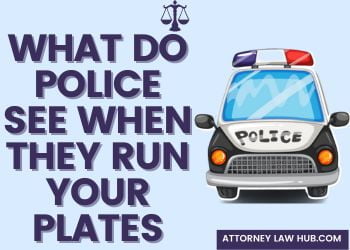When the police scan your licence plate, they might get important details about the car and its owner. They can use this information to determine whether the car is stolen, has any unpaid fines, or is associated with any active investigations.
They can view information such as the name and address of the registered owner, the condition of the vehicle’s registration, and if the vehicle is secured. When patrolling and communicating with drivers, officers might make decisions based on this information.
It is an important instrument for maintaining traffic safety and making sure that all moving vehicles are operating by the law.
What your licence plate reveals to police when they do a check?
Information about the car:
When a police officer scans your licence plate, they can get details about the actual car. Included in this are specifics like the car’s make, model, year, and colour. This enables them to confirm that the vehicle’s physical attributes relate to the data on file.
Registered Owner:
The name of the vehicle’s registered owner is visible to the authorities. This is important for figuring out who owns the car and if the individual driving it is authorised to do so. Additionally, they have access to the owner’s address, which may help them track down the owner if necessary.
Registration Status:
Whether the vehicle’s registration is up-to-date and current can be determined by the officer. There may be fines or penalties if the registration is invalid or if the car isn’t properly registered.
Verification of Insurance:
Police officers can determine whether the car is properly insured. Verifying insurance status helps to ensure that drivers are abiding by the law because it’s against the law to drive without insurance in many countries.
Outstanding Violations:
The system can notify the police of any unresolved crimes involving the car or its owner. Unpaid parking fines, moving charges, and other offences may fall into this category. Unresolved issues may have an impact on how the officer responds to the circumstances.
Check for a stolen vehicle:
Determining whether a vehicle has been reported as stolen is one of the most important purposes of running a licence plate. If the car matches a stolen vehicle, the officer can take the necessary steps to recover it and capture any suspects.
Warrants and Investigations:
In some instances, running a licence plate could show whether the car is connected to any active investigations or whether an arrest warrant has been issued for the owner. The officer’s attitude and behaviour when dealing with the driver can be guided by this information.
Security and Officer Awareness:
In general, the data obtained by running a licence plate helps police officers make knowledgeable choices when interacting with drivers. It improves their situational awareness and helps them enforce the law and ensure road safety.
Police officers can successfully perform their duties and obligations while engaging with drivers on the road by having access to this information. It’s an important tool that helps the community keep things in order, safe, and legal.
How Do Cops Run Your Plates?
Police officers use specialised licence plate recognition (LPR) technology in their vehicles to scan your licence plate. These devices use cameras to record the licence plate numbers of passing automobiles.
After obtaining the plate number, the officer uses a secure law enforcement database to connect and enter the number for a search. The vehicle’s make, model, registration status, insurance status, any unresolved violations, and any alerts about the vehicle or its owners, such as stolen vehicle reports or warrants, are all retrieved from the database and displayed in real-time.
When police contact drivers, this information gives them the knowledge they need to make wise judgements that promote road safety and law enforcement acceptance.
What do cops see when they run your plates?
When a police officer scans your licence plates, they can retrieve significant details regarding both your vehicle and its owner. This information contains specifics like the name and address of the registered owner, the make, model, year, and colour of the vehicle, as well as its registration status and if it is properly insured.
Officers can also look for warrants or pending traffic offences involving the car or its owner. They can find out whether the car has been reported stolen, which is important.
All of this data enables law enforcement personnel to make well-informed judgements during traffic stops, investigations, and emergencies, maintaining public safety, meeting legal requirements, and protecting individuals’ privacy rights.
Reasons Why Police Can Run Your Licence Plates:
Police officers have the right to check your number plates for several justifiable purposes, all of which are aimed at maintaining public safety as well as protecting the law. Here are a few typical explanations as to why they might:
Traffic Violations:
Police officers frequently scan licence plates to look for traffic offences. A car may be stopped, and the driver may receive an acknowledgement if it is registered with unpaid tickets or infractions.
Stolen Vehicles:
Identification of stolen automobiles is one of the main motives. The judicial system may swiftly discover whether a car has been reported stolen by running the licence plate, which enables them to take the necessary steps to get the car back and catch any culprits.
Warrants:
Police may run licence plates to look for any outstanding warrants for the car, its registered owner, or both. The police can take the required actions to hold the person or perform more investigation if there are open warrants.
Safety Checks:
To make sure that the vehicles on the road maintain safety and registration regulations, routine licence plate inspections are carried out. This promotes road safety and lowers the possibility of collisions brought on by poorly maintained or unregistered automobiles.
Parking Infractions:
Police officers may scan licence plates while they patrol for parking infractions to see if any cars are parked unlawfully or if any parking fines are still unpaid.
Suspicious Activity:
Running the licence plate can offer extra details on the owner and history of the car, which can help in analysing the situation if a vehicle or its occupants behave suspiciously.
It’s necessary to remember that law enforcement frequently runs licence plates to protect the law, guarantee traffic safety, and respond to crises. To preserve people’s rights to privacy, these checks are normally performed by legal requirements and standards.
Conclusion
The bottom line is that when police run your licence plates, they have access to a variety of data on your car and its previous owner.
This information includes specifics like the registered owner, the manufacturer and year of the car, its registration status, insurance coverage, any pending crimes, and any potential alarms like warrants or reports of vehicle theft.
To ensure public safety, legal observance, and the preservation of individuals’ privacy rights, police enforcement must have access to this information to make knowledgeable judgements during traffic stops, investigations, and emergencies.




